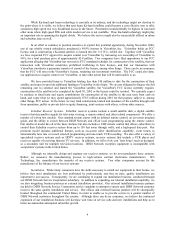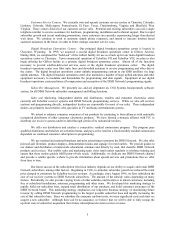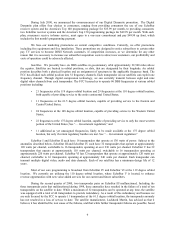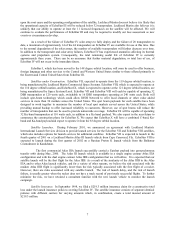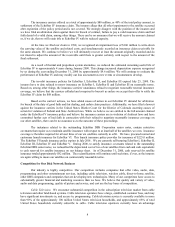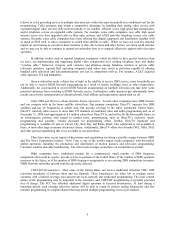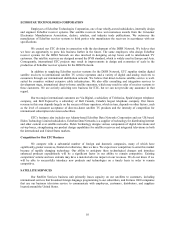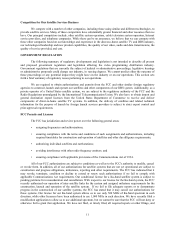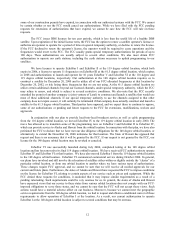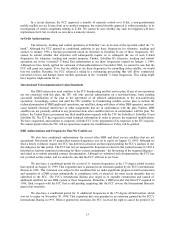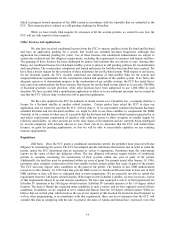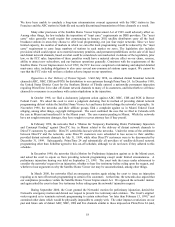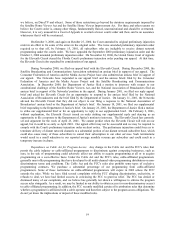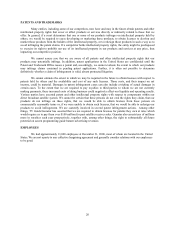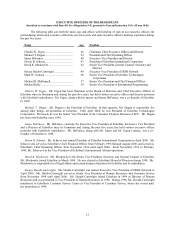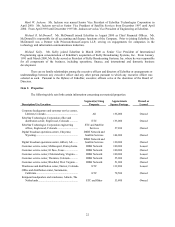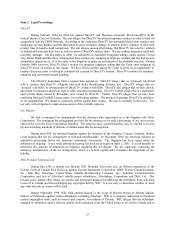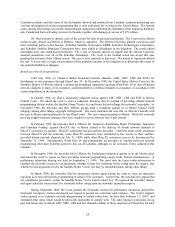Dish Network 2000 Annual Report Download - page 16
Download and view the complete annual report
Please find page 16 of the 2000 Dish Network annual report below. You can navigate through the pages in the report by either clicking on the pages listed below, or by using the keyword search tool below to find specific information within the annual report.14
failed to progress toward operation of the DBS system in accordance with the timetable that we submitted to the
FCC. That extension also is subject to a still pending challenge by PrimeStar.
While we have timely filed requests for extension of all the western permits, we cannot be sure how the
FCC will act with respect to these requests.
Other Licenses and Applications
We also have received conditional licenses from the FCC to operate satellites in the Ka-band and Ku-band
and have an application pending for a system that would use extended Ku-band frequencies (although that
application has remained pending for years). Use of those licenses and conditional authorizations are subject to
certain due technical and due diligence requirements, including the requirement to construct and launch satellites.
The granting of those licenses has been challenged by parties with interests that are adverse to ours. Among other
things, our conditional license for a Ku-band satellite system is subject to still pending petitions for reconsideration
and cancellation. The construction, completion and launch milestones for both Ku-band satellites have expired. We
have filed a timely request for the extension of these milestones for our Ku-band system. With respect to our license
for the Ka-band system, the FCC recently authorized our operation of inter-satellite links for the system and
assigned milestone requirements for the construction, launch and operation of the satellite system. If we fail to file
adequate reports or to demonstrate progress in the construction of our satellite systems, the FCC has stated that is
may cancel our authorizations for those systems. Our license for our Ka-band system allows us to use only 500 MHz
of Ka-band spectrum in each direction, while other licensees have been authorized to use 1,000 MHz in each
direction. We have recently filed a modification application to allow us to use additional spectrum, but we cannot be
sure that the FCC will not deny or otherwise fail to grant that application.
We have also applied to the FCC for authority to obtain control over VisionStar, Inc., a company that has a
license for a Ka-band satellite at another orbital location. Certain parties have asked the FCC to deny our
application, and we cannot be sure that the FCC will not deny it. If we successfully construct and launch Ku-band,
extended Ku-band and low Ka-band satellites, we might be able to use those satellites to complement the DISH
Network, or for a variety of other uses. It is possible that the Ku-band and Ka-band orbital locations requested by us
and others could permit construction of satellites with sufficient power to allow reception of satellite signals by
relatively small dishes. As these projects are in the early stages of development and are currently being challenged
by several companies with interests adverse to ours, there can be no assurance that the FCC will sustain these
licenses, or grant the pending applications, or that we will be able to successfully capitalize on any resulting
business opportunities.
Regulations
DBS Rules. Once the FCC grants a conditional construction permit, the permittee must proceed with due
diligence in constructing the system. The FCC has adopted specific milestones that must be met in order to retain the
permit, unless the FCC determines that an extension or waiver is appropriate. Permittees must file semi-annual
reports on the status of their due diligence efforts. The due diligence milestones require holders of conditional
permits to complete contracting for construction of their systems within one year of grant of the permit.
Additionally, the satellites must be operational within six years of grant. For permits issued after January 19, 1996,
permittees must complete construction of the first satellite in their system within four years of grant of the permit.
The FCC also may impose other conditions on the grant of the permit. The holders of new DBS authorizations
issued on or after January 19, 1996 must also provide DBS service to Alaska and Hawaii from at least one of their
DBS satellites or they will have to relinquish their western assignments. We are presently not able to satisfy this
requirement from the 148 degree orbital location. With respect to the EchoStar I satellite, we have received a waiver
of that requirement subject to several onerous conditions. We have also requested a waiver of that requirement for
EchoStar IV operation at the 148 degree orbital location. EchoStar IV currently operates at the 119 degree orbital
location. The state of Hawaii has requested many conditions to such a waiver, and we have opposed several of these
conditions. In addition, we are required to serve Alaska and Hawaii from the 110 degree orbital location. While we
believe that our current plan, which involves the use of our capacity at that location for local-into-local broadcast as
well as other programming, is in compliance with that requirement, there can be no assurance that the FCC will
consider this plan as complying with the rule. In general, the states of Alaska and Hawaii have expressed views that


